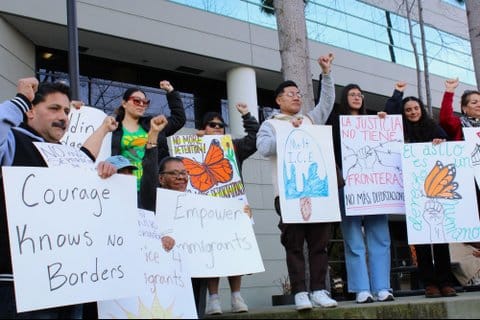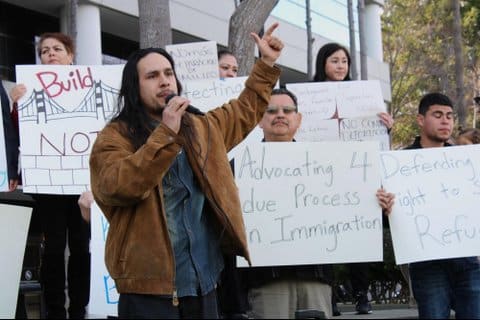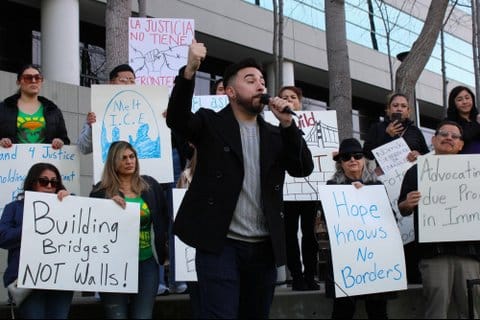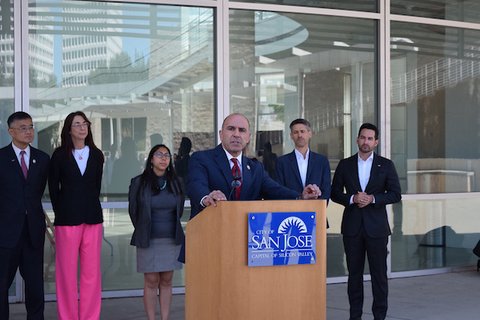
20 Feb Attorney Says New Immigration Court Meant to ‘Deport as Many People as Possible’

Activists stand together at a press conference on the steps of a new immigration court in Concord to support immigrants’ rights.
Story by Ana Tellez-Witrago | Photos by Joe Porrello
Immigrant rights advocates expressed concern in a Feb. 12 press conference over a new deportation court that opened that day in Concord.
The court, opened by the U.S. Department of Justice’s Executive Office for Immigration Review, is meant to address the nationwide backlog of immigration cases, which now stands at over 3.3 million, according to the Transactional Records Access Clearinghouse at Syracuse University.
But the advocates say that immigrants, many of whom already face the fear of appearing in court without adequate legal resources and not speaking English at all or as their first language, now confront additional uncertainty.
“It’s very important to understand that the purpose of these courts is to deport immigrants,” said Heliodoro Moreno, an immigration attorney with Stand Together Contra Costa, a partnership of several immigration rights organizations and the Contra Costa Public Defenders offices. “It’s meant to do that, to deport as many people as possible.”
According to a 2022 report to Congress, 65% of initial immigration cases heard at EOIR courts resulted in deportation, while only 13% of cases were granted relief from deportation, such as asylum.
>>>Read: Barbed Wire & Glitchy Phone App Stand Between Asylum Seekers and U.S.
According to Rosa Menjivar, the advocacy manager with the Latina Center in Richmond, many people are seeking asylum at the border. They are allowed in the country but must present their case before a judge to remain in the United States, whether they have an attorney or not.
Unlike criminal defendants, immigrants who cannot afford an attorney are not provided with government-appointed counsel.
“You have to go in there and represent yourself even if you’re a little kid,” Moreno said.
Although most EOIR cases result in deportation, having legal representation can significantly improve the outcome. A Syracuse University data study showed that those with legal representation had a higher chance of having their cases dismissed or receiving relief from deportation compared with those who were unrepresented.
Moreno said the opening of courts like this one have led to fewer immigrants having a lawyer, which, in turn, has led to more being deported.
“Immigrants that have an attorney win their cases over 60% of the time, but when they don’t, that drops down to less than 20%,” he said.
Edwin, a young immigrant identified only by first name due to his immigration status, spoke at the press conference. He came to the United States to escape violence in his home country. A little after Edwin entered the country, his brother was deported. He was worried about his court hearing since he did not have money to hire an attorney. Fortunately, with the help of a teacher, Edwin found STCC, which provided him with the legal support he needed. Edwin asked the crowd and STCC to continue supporting immigrants like him who need legal assistance.
Onetime Antioch poet laureate Jose Cordon, who works with Monument Impact, spoke at the press conference as well.
“Some people don’t understand why others would risk life to come here,” he said before reciting from his poem “Blood Papers,” which speaks to the immigrant experience and dreams.
“I have something that many people take for granted, something that makes thousands cross the Rio Grande in the middle of the darkness. Imagine your child in your arms, and you try to escape from all the madness…”
- Poet Jose Cordon recites one of his pieces that speaks from the perspective of an immigrant in the U.S.: “…you try to escape from all the madness.”
Trying to navigate the legal system can be its own form of madness for migrants as “experts have called these immigration laws a labyrinth,” according to Moreno.
“The county and all of the other local governments…should be providing resources to their communities and constituents to ensure they are getting their due process,” said Maciel Jacques, Centro Legal de La Raza deputy director.
>>>Read: After Escaping Abuse, Immigrant Victims Forced to Endure Long Waits With Little Hope
Last year, the Contra Costa Supervisors allocated funding to hire more attorneys within STCC to help with immigration cases. However, more funding is likely needed because the Concord court will hear cases from 10 counties.
The advocates also say more transparency is needed with the case transfers from the San Francisco jurisdiction to Contra Costa.
“EOIR has issued little to no notice of the cases transferred from the San Francisco jurisdiction to Contra Costa, raising significant due process concerns and sparking confusion among community members,” said the California Collaborative for Immigrant Justice in a statement.
- Co-executive director of California Collaborative For Immigration Justice Edwin Carmona-Cruz speaks at a press conference in Concord about what he and his initiative are doing to protect immigrants from deportation.
Immigrant rights advocates said to verify whether their cases have been transferred, people should first identify their case’s A number, or alien registration number. It is a unique identifier essential for tracking case transfers. Then, they can inquire about the status of their case by calling the EOIR hotline at 1-800-898-7180 or visiting the following website: https://acis.eoir.justice.gov/en/.
Later this year, people will have an opportunity to meet with an immigration attorney for free.
The Latina Center and Stand Together Contra Costa will host a free immigration clinic Apr. 15, from 9:30 a.m. to 2 p.m., at the Latina Center located at 3701 Barrett Ave. Richmond, CA 94805. The consultations will be first come, first served.
Stand Together Contra Costa has information on additional Immigration clinics on its Facebook page: https://www.facebook.com/StandTogetherContraCosta.








No Comments